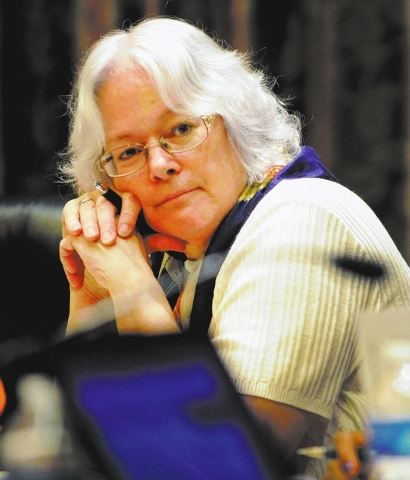Ethics commission considers settlement with CCSD officials

Witnesses had been subpoenaed.
A full-blown state investigation was underway.
The hearing was set for Nov. 20 to determine whether Clark County School Board President Carolyn Edwards broke the state law that prohibits spending public dollars to lobby for a campaign.
“We were jumping headfirst into a hearing,” said Caren Cafferata-Jenkins, executive director of the Nevada Commission on Ethics, which unanimously decided on Sept. 18 to deny Edwards’ request to throw out its investigation of her actions during last year’s general election, and instead dig deeper.
But the digging has been halted, the hearing canceled and witnesses released from their subpoenas, Cafferata-Jenkins confirmed Tuesday.
“We’re putting the brakes on the trial prep,” because a proposed settlement will instead be brought to the commission on Nov. 20, Cafferata-Jenkins said.
The eight-member commission will consider the settlement proposed by Edwards’ attorney behind closed doors and then vote on it in public.
If approved, the terms will be released to the public. If not, the hearing will be rescheduled. Should the commission find Edwards committed a willful violation, she could face a maximum fine of $5,000 and the possibility of being removed from office.
But Cafferata-Jenkins said settlements are reached more often than not and are preferred if terms do justice to the law that may have been broken.
A settlement is much cheaper to taxpayers than a full hearing, she said.
State attorneys are bringing Edwards’ settlement agreement to the commission because they feel it is agreeable, she said.
Another settlement will also be on the table for Clark County School District Associate Superintendent and lobbyist Joyce Haldeman. The state was also investigating her for using district resources to transport, store and disperse campaign materials supporting the passage of Question 2.
In the 2012 election, the Clark County School District posed a ballot question to county voters, asking them to increase property taxes by 21 cents per $100 of assessed valuation, generating an estimated $669 million over six years for improvements at 40 schools. The ballot question overwhelmingly failed after 66 percent of voters rejected it.
Before the election, Edwards had a district employee send an email blast on Oct. 20 seeking volunteers to “distribute door hangers and yard signs to registered voters encouraging them to support Question 2.”
State law prohibits public employees from “requesting” or causing a governmental entity “to incur expense or make expenditure to support or oppose a ballot question.”
School district officials declined to comment on the settlement since the case is still ongoing.
Contact reporter Trevon Milliard at tmilliard@reviewjournal.com or 702-383-0279.












